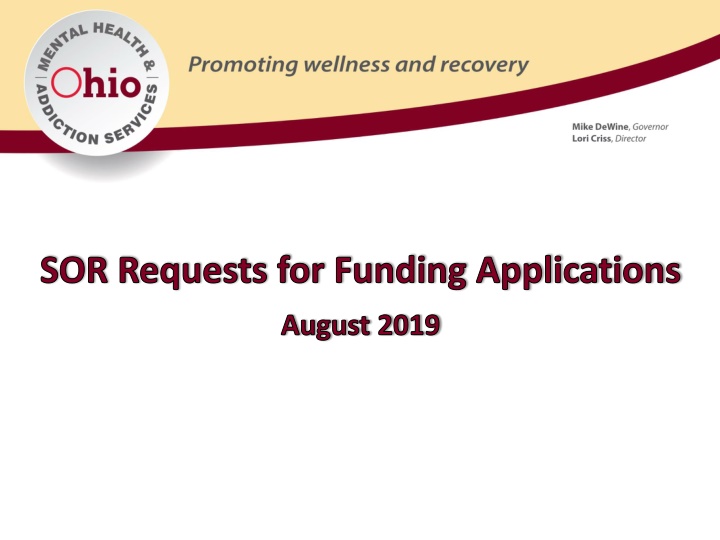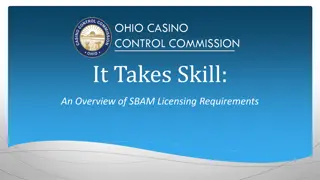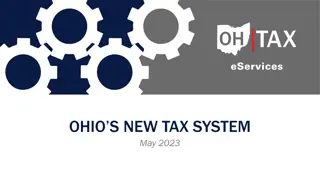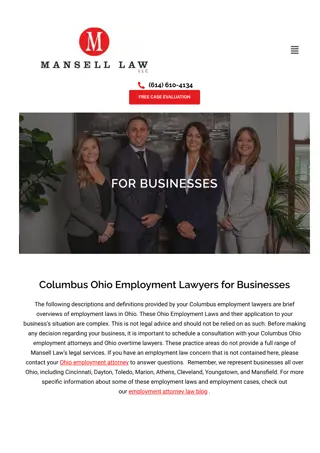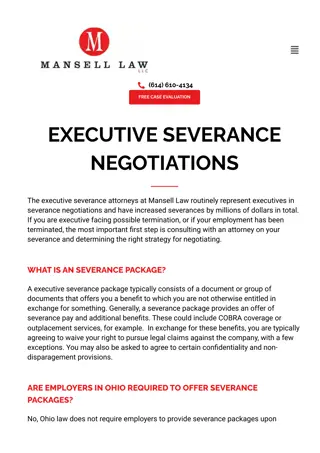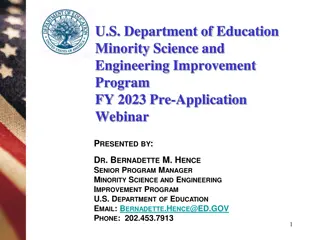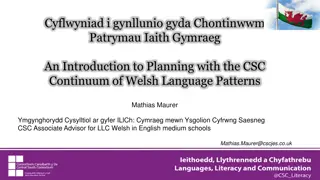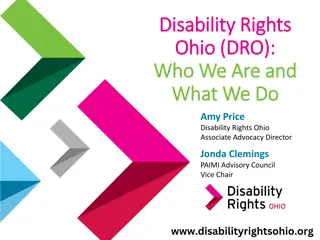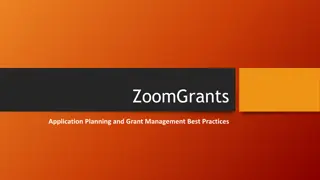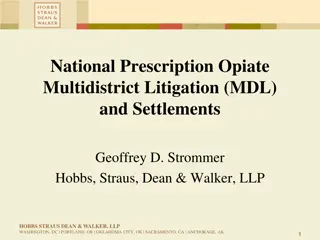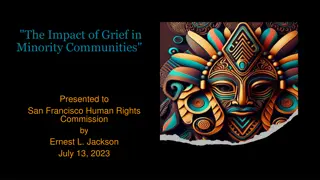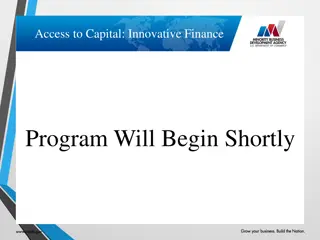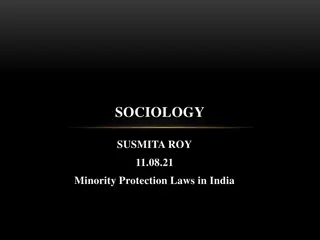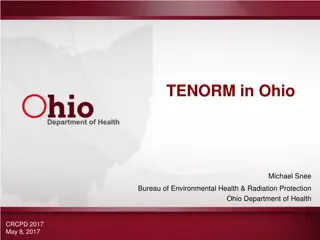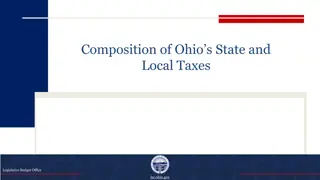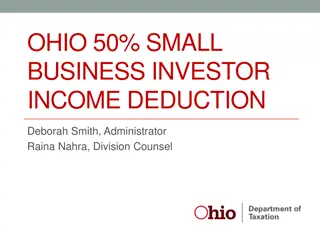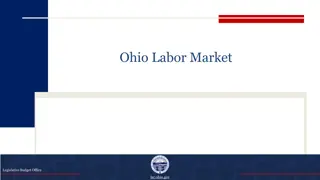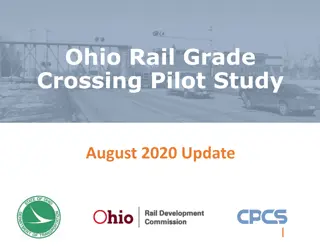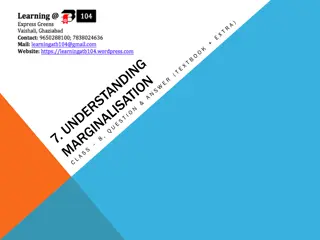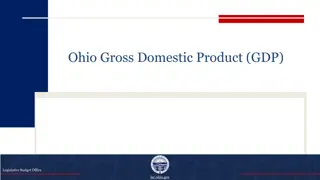Ohio Opiate Response Continuum Grant for Minority Communities
The Ohio State Opioid Response (SOR) Project aims to establish a comprehensive care system for African American, Hispanic/Latino American, and other minority communities affected by opioid use disorder. The project focuses on integrating physical health, emergency health care, behavioral health care, criminal justice, and child welfare services. Eligible applicants are encouraged to submit proposals aligning with the program goals of enhancing medication-assisted treatment, addressing unmet treatment needs, and reducing opioid overdose-related deaths by the submission deadline of September 20, 2019.
Download Presentation

Please find below an Image/Link to download the presentation.
The content on the website is provided AS IS for your information and personal use only. It may not be sold, licensed, or shared on other websites without obtaining consent from the author.If you encounter any issues during the download, it is possible that the publisher has removed the file from their server.
You are allowed to download the files provided on this website for personal or commercial use, subject to the condition that they are used lawfully. All files are the property of their respective owners.
The content on the website is provided AS IS for your information and personal use only. It may not be sold, licensed, or shared on other websites without obtaining consent from the author.
E N D
Presentation Transcript
SOR Requests for Funding Applications August 2019
Background Information The Ohio State Opioid Response (SOR) Project will focus on building a community system of care (prevention, early intervention, treatment and recovery supports) that emphasizes service integration between physical health, emergency health care, behavioral health care, criminal justice, and child welfare. The geographic area for this project is the State of Ohio. The population of focus is African American, Hispanic/Latino American, and other minority communities adolescents and adults with a primary or secondary diagnosis of opioid use disorder or those with a documented history of opiate related overdose. All proposals must meet the three goals of the State Opioid Response grant program including: Increases in medication-assisted treatment Reduction in unmet treatment needs Reduction in opioid overdose related deaths Deadline for submission of all applications is September 20, 2019 by 5:30PM Eastern Daylight Savings Time to SORTreatment@mha.ohio.gov
Eligible Applicants: ADAMH Boards or joint applications from ADAMH Boards in partnership with at least three of the following community members with signed MOUs at the time of application: Medical providers with a mission statement that incorporates providing culturally competent services to African American, Hispanic/Latino American, and other minority community members Law enforcement personnel including police department, sheriff department, jail staff and jail medical provider Area agency on aging Senior center, senior living provider, or other organization focusing on African American, Hispanic/Latino American, and other minority community members aged 55 and above Peer Run Organizations with direct contact and demonstrated effectiveness in working with African American, Hispanic/Latino American, and other minority community members Community agencies that have historically provided support services to the underserved African American, Hispanic/Latino American, and other minority community members in addressing the impacts of health disparities and inequities (e. g Urban Minority Alcohol Drug Addiction Outreach Programs, Urban League) African American and Hispanic/Latino Coalitions and community collaboratives who have historically and/or are currently providing culturally appropriate services to these communities. Urban Minority Alcoholism and Drug Abuse Outreach Program Re-entry coalitions for the community with priority focus on African American, Hispanic/Latino American, and other minority community members Multi denominational organizations Children Family First Council
Ohio Opiate Response Continuum Grant for Treatment for Members of the African American, Hispanic/Latino American, and other Minority Communities Purpose of RFA The SOR Project has made approximately $12 million dollars available through October 1, 2020 to partner with local ADAMH Boards and their partners to provide funding for programs and projects that will increase access to treatment and recovery supports for African American, Hispanic/Latino American, and other minority community members. Intended Outcome: To increase the availability of treatment and recovery evidence- based MAT along with the full continuum of treatment and recovery support services that is provided in a culturally competent service setting to African American, Hispanic/Latino American, and other minority community members.
Ohio Opiate Response Continuum Grant for Treatment for Members of the African American, Hispanic/Latino American, and other Minority Communities All persons served with treatment and recovery supports must have a primary or secondary diagnosis of OUD and/or a documented history of opioid related overdose. Funds may be used for the following: Implement the full spectrum of treatment and recovery supports that increases long-term positive outcomes and incorporates the Evidence-Based Practices (EBP), including adapted EBP, of medication assisted treatment focusing on African American, Hispanic/Latino American, and other minority community members Implement community recovery support services such as peer supports and recovery housing for Treatment including access to all forms of MAT for African American, Hispanic/Latino American, and other minority community members
Ohio Opiate Response Continuum Grant for Treatment for Members of the African American, Hispanic/Latino American, and other Minority Communities Funds may be used for the following: Implement prevention education services for African American, Hispanic/Latino American, and other minority community members (no primary prevention as outcomes must come within the grant year) Training of healthcare professionals on the assessment and treatment of OUD in African American, Hispanic/Latino American, and other minority communities Training of peer recovery supporters and first responders on recognition of opioid overdose and appropriate use of the opioid overdose antidote naloxone Developing evidence-based, or adapted evidence-based, community prevention efforts including evidence-based strategic messaging on the consequence of opioid misuse in African American, Hispanic/Latino American, and other minority communities Purchasing and distributing naloxone and training on its use Assisting African American, Hispanic/Latino American, and other minority community members with treatment costs and develop other strategies to eliminate or reduce treatment costs for uninsured or underinsured patients. Providing treatment transition and coverage for African American, Hispanic/Latino American, and other minority community members reentering communities from criminal justice settings or other rehabilitative settings. Creating and identifying local steering committee to function as an advisory group for the response for the request for applications. This local steering committee is expected to meet monthly throughout the during of this funding opportunity Incorporate the social determinants of health
Questions for Ohio Opiate Response Continuum Grant for Treatment for Members of the African American, Hispanic/Latino American, and other Minority Communities Additional Questions: SORTreatment@mha.ohio.gov
Ohio Opiate Response Grant Opportunities for Increasing Access and Services to High Risk Families All members of the focus population served with treatment and recovery supports must have a primary or secondary diagnosis of OUD and/or a documented history of opioid related overdose; or be their child or guardian of a child or a person who has a primary or secondary diagnosis of OUD and/or a documented history of opioid related overdose. Services available to the child are limited to assessment, referral to treatment, and recovery supports that engage the parent and/or guardian including family recovery housing that accept all forms of MAT, kinship care, and navigation and peer supports. Services available to the child are limited to assessment, referral to treatment and recovery supports that engage the parent and/or guardian including family recovery housing that accept all forms of MAT, kinship care and navigation and peer supports.
Ohio Opiate Response Grant Opportunities for Increasing Access and Services to High Risk Families All members of the focus population served with treatment and recovery supports must have a primary or secondary diagnosis of OUD and/or a documented history of opioid related overdose; or be their child or guardian of a child or a person who has a primary or secondary diagnosis of OUD and/or a documented history of opioid related overdose. Services available to the child are limited to assessment, referral to treatment, and recovery supports that engage the parent and/or guardian including family recovery housing that accept all forms of MAT, kinship care, and navigation and peer supports. Services available to the child are limited to assessment, referral to treatment and recovery supports that engage the parent and/or guardian including family recovery housing that accept all forms of MAT, kinship care and navigation and peer supports.
Ohio Opiate Response Grant Opportunities for Increasing Access and Services to High Risk Families Additional Required Activities include: Increased clinician access to screening for members of the focus population through the child services or child welfare agency by embedding a diagnosing clinician at the agency to provide first day access to an assessment for both parents and children, a referral for ongoing treatment that includes medication assisted treatment for opiate use disorder at all levels of care, and clinical support for child welfare staff Increased access to kinship navigation and family support services through outreach to members of the focus population that is culturally appropriate and engages with community-based providers of culturally competent services All proposals must utilize existing media messaging and other outreach campaign materials. New content creation is not an allowable activity in this proposal Incorporate Trauma Informed Care and historical trauma for members of the focus population into existing training models for foster parents
Questions for Ohio Opiate Response Grant Opportunities for Increasing Access and Services to High Risk Families Additional Questions: SORTreatment@mha.ohio.gov
